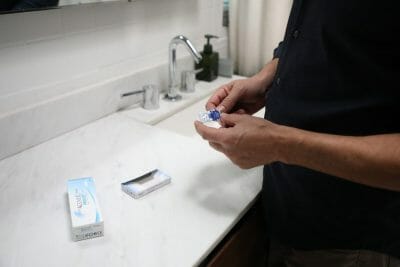Contact lenses are a popular vision correction option for people who do not want to wear glasses. They are small, thin lenses that are placed directly on the eye’s surface. Contact lenses come in various types, each with its unique features and benefits. In this blog, we will explore the different types of contact lenses available in the market.
In this blog, we will explore the different types of contact lenses available in the market.
Types of Contact Lenses:
Soft Contact Lenses:
Soft contact lenses are the most popular type of contact lenses. They are made of soft, flexible plastic that conforms to the shape of the eye. Soft contact lenses come in various types, including daily wear, extended wear, and disposable lenses. They are comfortable to wear and are suitable for people with a wide range of vision correction needs.
Rigid Gas Permeable (RGP) Contact Lenses:
RGP contact lenses are made of a firm, durable plastic that allows oxygen to pass through to the eye’s surface. They provide sharper vision than soft contact lenses and are suitable for people with astigmatism and presbyopia. RGP lenses require a more extended adaptation period than soft lenses but are more durable and longer-lasting.
Hybrid Contact Lenses:
Hybrid contact lenses are a combination of soft and RGP lenses. They have a soft outer layer and a rigid center that provides clear vision. They are suitable for people with astigmatism and presbyopia and provide the comfort of soft lenses with the clarity of RGP lenses.
Scleral Contact Lenses:
Scleral contact lenses are large-diameter lenses that rest on the sclera or the white part of the eye. They are suitable for people with irregular corneas or severe dry eyes. Scleral lenses provide clear vision and comfort by creating a tear-filled vault over the cornea.
How Long Can You Wear Contact Lenses?
Contact lenses can be worn for varying lengths of time, depending on the type of lens and the wearer’s needs. Daily wear lenses are designed to be worn for up to 12 hours a day, while extended wear lenses can be worn for up to 30 days continuously. However, it is essential to follow your eye doctor’s recommendations on how long to wear your contact lenses to avoid eye infections and other complications.
What Are the Best Contact Lenses for Dry Eyes?
Dry eyes are a common problem for contact lens wearers. However, some contact lenses are designed to be more comfortable for people with dry eyes. Silicone hydrogel lenses are an excellent option for people with dry eyes as they allow more oxygen to reach the eye’s surface, reducing the risk of dryness and discomfort. Daily disposable lenses are also a good choice as they provide a fresh, clean lens every day, reducing the risk of irritation and infection.
How to Prevent Contact Lenses from Drying Out?
Contact lenses can dry out if they are not properly cared for. To prevent this, it is essential to follow the manufacturer’s instructions for cleaning and storing your lenses. Use a contact lens solution that is compatible with your lenses and avoid using tap water or saliva to clean them. It is also important to keep your lenses hydrated by using eye drops specifically designed for contact lenses.
Conclusion:
It is essential to follow your eye doctor’s recommendations on how long to wear your contact lenses and to care for them properly to prevent dryness and discomfort. By understanding the different types of contact lenses available, you can make an informed decision on which one is right for you.
